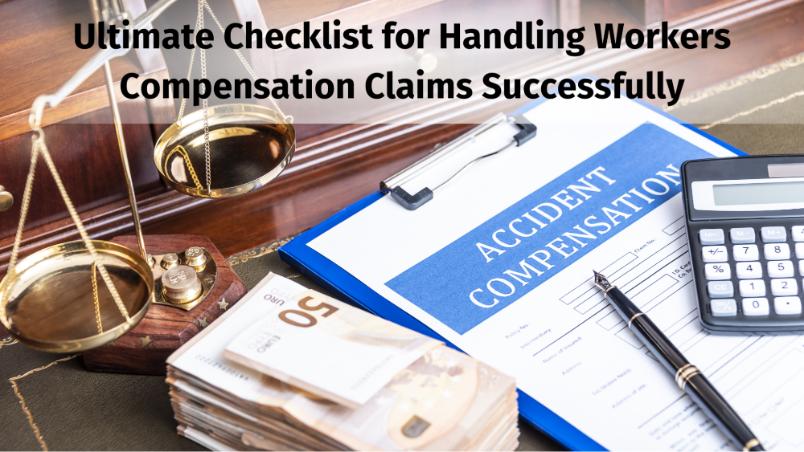As an employee, your well-being and safety should be the top priority. Unfortunately, workplace injuries and illnesses can occur, and when they do, it’s important to handle workers’ compensation claims efficiently and effectively. However, dealing with the claims process can be complex and overwhelming.
Proper handling of your workers’ compensation claim is crucial for ensuring a smooth and efficient resolution, protecting your rights, and maintaining a positive work environment. This blog post provides you with an ultimate checklist to help you handle your workers’ compensation claim successfully.
Understand Your Rights and Dispute Resolution Options
In some cases, workers’ compensation claims may be denied or disputed. Familiarize yourself with the appeals process in your state, including deadlines and procedures for filing an appeal or requesting a hearing.
Depending on the circumstances, alternative dispute resolution methods, such as mediation or arbitration, may be available to resolve disputes without the need for lengthy legal battles. These methods can help save time and resources while fostering a more collaborative resolution.
Seeking Legal Counsel
While navigating the workers’ compensation system alone is possible, seeking legal counsel can be beneficial in certain situations. If your claim is denied or there is a dispute over benefits, an attorney can guide you through appeals and negotiations.
Laws and regulations vary across different states in the U.S., and consulting a local attorney familiar with your state’s workers’ compensation laws can provide valuable guidance. For instance, in California, workers’ compensation laws have specific nuances and deadlines that must be adhered to.
This makes the advice of a Los Angeles employment attorney particularly valuable. While involving legal counsel may incur costs, it can ensure you receive fair compensation and protect your rights. For complex cases involving medical issues or third-party liability, legal representation can protect your rights. Additionally, if you face retaliation or discrimination, an attorney can take appropriate action.
Immediate Response and Reporting
Taking immediate action after a work-related injury or illness is crucial for ensuring proper documentation and initiating the claims process promptly. Seeking prompt medical attention should be the top priority, as it not only addresses your health needs but also creates an official record of the incident and its effects.
Thoroughly document all details surrounding the event, including the date, time, location, a detailed description of what occurred, and any potential contributing factors. Obtain witness statements and visual evidence, such as photographs or videos of the scene, if possible.
These will serve as valuable supporting documentation for your claim. Most states have strict deadlines for reporting work-related injuries or illnesses, so it’s essential to notify your employer as soon as possible, typically within a few days or weeks.
Gather and Organize Documentation
- Collect employment records, job descriptions, training documents, medical records, and previous claims records.
- Maintain an organized file system, physical or digital, for easy access to documents.
- Promptly respond to requests for additional documentation or clarification.
- Having well-documented and organized records strengthens your case.
- Be prepared to provide incident details, medical records, wage information, and witness statements.
- Update your documentation file regularly with new relevant information.
- Consider maintaining copies of all submitted documents for your records.
Notify Relevant Parties
Depending on the severity and nature of the incident, there may be additional parties that need to be notified. In some cases, you may be required to report the incident to regulatory authorities like the Occupational Safety and Health Administration (OSHA) or your state’s workers’ compensation board.
Familiarize yourself with the reporting requirements in your state, as certain incidents must be reported within specific timeframes. When notifying these authorities, provide detailed information about the incident, including the cause, nature of injuries or illnesses sustained, and any corrective actions taken.
Cooperating fully with investigations and providing accurate information can help ensure compliance with regulations and facilitate a smoother claims process. Failure to report required incidents could result in penalties or fines, so it’s essential to understand and adhere to these obligations.
Facilitate Medical Treatment and Return-to-Work Programs
|
Communicate Effectively and Transparently
Fostering open and transparent communication with your employer throughout the claims process is crucial for maintaining a positive and supportive work environment. Regularly request updates on the status of your claim, any outstanding documentation needed, and the anticipated timeline for resolution.
Address any concerns or issues promptly to prevent misunderstandings and facilitate a more efficient resolution. Clear and consistent communication can help build trust and demonstrate your commitment to a collaborative process.
Advocate for Preventive Measures
Conduct root cause analysis: Identify factors that contributed to the incident or injury.
Enhance safety protocols: Advocate for improved safety guidelines and procedures in the workplace.
Implement additional training: Participate fully in training programs to boost your safety awareness and skills.
Modify facilities/equipment: Recommend necessary changes to facilities or equipment to mitigate risks.
Promote safety culture: Make safety a priority in everything you do at work.
Stay Up-to-Date with Regulations and Resources
Workers’ compensation laws and regulations are subject to change, so it’s essential to stay informed about any updates or amendments that may affect your rights or the claims handling process. Participate in employee resource groups, attend workshops or webinars, and utilize educational materials provided by industry associations, or government agencies.
This knowledge can help you better understand your responsibilities, stay abreast of best practices, and navigate the system more effectively. Additionally, monitor changes in local, state, or federal regulations that may impact workers’ compensation claims, benefits, or protections.
By staying up-to-date and informed, you can ensure you are taking the appropriate steps to protect your rights and maximize the benefits you are entitled to under the law.
| Step | Actions |
| Immediate Response | Seek medical attention, Document incident details, and Notify the employer promptly |
| Notify Relevant Parties | Report to regulatory authorities (OSHA, workers’ comp board), Provide detailed information |
| Documentation | Collect employment, medical, and training records, Maintain organized files |
| Medical Treatment | Follow the treatment plan, Explore return-to-work options |
| Communication | Request claim status updates, Address concerns with the employer |
| Preventive Measures | Identify root causes, Advocate for safety improvements |
| Legal Counsel | Seek representation for claim denials or disputes, Protect rights in complex cases |
| Stay Up-to-Date | Monitor regulation changes, Utilize educational resources |
Conclusion
Handling your workers’ compensation claim successfully is crucial for protecting your rights, receiving proper medical care and compensation, and maintaining a positive work environment. By following the ultimate checklist outlined in this blog post, you can navigate the claims process effectively, minimize disputes, and ensure your well-being is prioritized.
Remember, prevention is key, so advocate for enhanced workplace safety and training programs to reduce the risk of workplace injuries and illnesses. With the right approach, you can protect your rights and contribute to creating a safer and more supportive work environment.
Frequently Asked Questions
What if my workers’ compensation claim is denied or disputed?
Familiarize yourself with the appeals process in your state, and consider alternative dispute resolution methods like mediation or arbitration.
How can I prevent similar incidents from occurring in the future?
Advocate for a thorough root cause analysis, and support the implementation of enhanced workplace safety measures and training programs.
Where can I find additional resources and stay up-to-date with workers’ compensation regulations?
Utilize employee resource groups, attend workshops or webinars, and monitor changes in laws and regulations.































